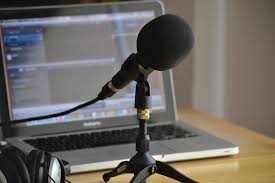Podcasting
What It Is: Podcasting involves creating and distributing episodic audio content that listeners can subscribe to and download or stream online. For a homepreneur, this can range from recording and publishing regular episodes on a specific niche to eventually building a full-fledged media company. Podcasts serve as powerful platforms for sharing expertise, storytelling, interviewing guests, building a community, and establishing thought leadership in a chosen field.Outlook: The podcasting industry is experiencing explosive growth in listenership and advertising revenue. According to Statista, the number of podcast listeners worldwide is projected to exceed 500 million by 2025. Edison Research consistently reports high listenership rates, with a significant percentage of the adult population listening monthly. This robust and expanding audience creates substantial opportunities for monetization through advertising, sponsorships, premium content, and building a platform for other products or services. As a form of accessible, on-demand content, podcasting's growth trajectory is very strong for the foreseeable future. Startup Cost:
- Minimal ($0 - $150): You can start with effectively no upfront cost if you use an existing computer (a Chromebook is sufficient), your smartphone's microphone (for initial recordings), and free audio editing software (e.g., Audacity, GarageBand).
- Low to Moderate (Hundreds of Dollars): Investing in a good quality USB microphone (e.g., Blue Yeti, Rode NT-USB Mini), basic headphones, and a subscription to a dedicated podcast hosting platform (e.g., Anchor.fm/Spotify for Podcasters (free), Buzzsprout, Libsyn, Transistor.fm – typically $10-$50/month) will significantly improve audio quality and distribution.
- Professional (Thousands of Dollars): Higher-end dynamic microphones (e.g., Shure SM7B), audio interfaces, mixing boards, and professional acoustic treatment for your recording space would be for more advanced setups.
- Niche Focus & Expertise: A clear understanding of your chosen topic and the ability to provide valuable insights or engaging content within that niche.
- Creativity & Narrative: The ability to develop compelling concepts, tell engaging stories, or structure informative discussions.
- Clear & Engaging Delivery: While a "smooth voice" is a bonus, clarity, good pacing, and an engaging speaking style are essential.
- Audio Editing: Fundamental skills in editing audio, including removing mistakes, improving sound quality, and adding music/sound effects.
- Technical Knowledge: Understanding basic recording equipment, audio file formats, and how to upload and distribute episodes via a podcast host.
- Project Management: Organizing recording sessions, episode planning, and maintaining a consistent release schedule.
- Communication & Marketing: Promoting your podcast to attract listeners and engaging with your audience.
- Define Your Concept & Audience: Identify your podcast's specific niche, target audience, and unique value proposition. What problem do you solve or what entertainment do you provide?
- Choose Your Format: Decide on your podcast's format (e.g., solo monologue, interview, co-hosted, narrative storytelling) and desired episode length.
- Acquire Basic Equipment & Software: Start with your computer. Invest in at least a decent USB microphone and use free audio editing software to begin. Find a quiet space for recording, as good acoustics (even improvised with blankets) are vital.
- Record & Edit Initial Episodes: Record a few pilot episodes. Practice clear speaking and engaging delivery. Edit your audio to remove errors, improve sound, and add any intros/outros or music.
- Create Podcast Artwork: Design compelling cover art for your podcast (a key visual element for discovery). AI tools can assist with brainstorming or generating elements for your artwork.
- Select a Podcast Hosting Platform: Choose a platform that stores your audio files and generates the RSS feed necessary for distributing your podcast to listening apps (e.g., Spotify for Podcasters/Anchor.fm, Buzzsprout, Libsyn).
- Submit to Directories: Submit your podcast's RSS feed to major podcast directories (e.g., Spotify, Apple Podcasts, Google Podcasts, Amazon Music).
- Develop a Release Schedule: Establish a consistent schedule (e.g., weekly, bi-weekly) for publishing new episodes and stick to it to build listener habits.
